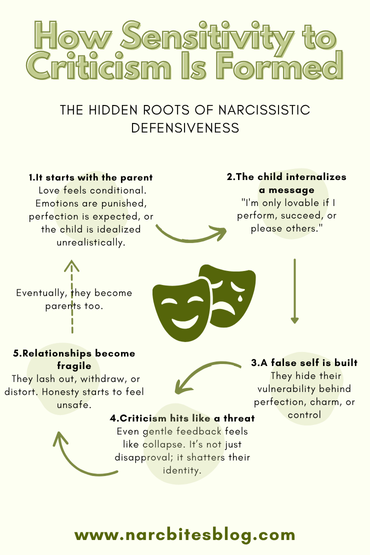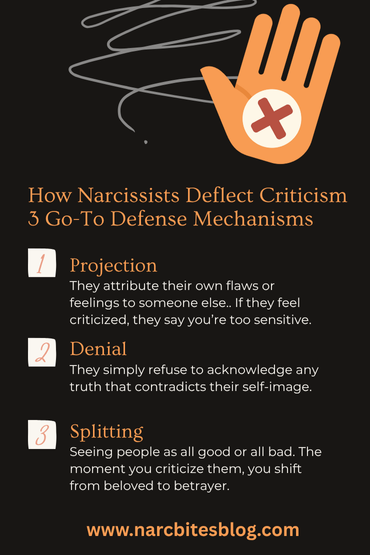Have you ever offered gentle criticism to a narcissist, something that anyone else would take in stride, and watched them implode, explode, or completely shut down? Maybe it was a mild suggestion. A passing comment. A request for change.
And suddenly, you’re under attack. Or being stonewalled. Or somehow apologizing for hurting their feelings.
Why does this happen? Why does even the lightest criticism feel like a nuclear bomb to a narcissist?
Let’s unpack it, because understanding this reaction is key to protecting your peace, especially when you’ve spent time around someone who expects admiration but offers none in return.

The Grandiose Illusion
At the core of narcissism — covert or overt — lives an elaborate illusion: I am special. Superior. Exceptionally unique.
This isn’t healthy confidence. It’s a psychological defense structure built to protect a fragile self. And any challenge to that image, no matter how small, feels like a threat to their survival.
When you criticize a narcissist, you’re not just offering feedback — you’re cracking their carefully constructed identity. You’re forcing them to confront the reality that they are not perfect.
And for someone whose emotional safety depends on being seen as flawless, that confrontation is intolerable.
This is why narcissists require near-constant admiration. It isn’t just about vanity. It’s about survival. That admiration isn’t icing — it’s armor. It reinforces the illusion and keeps the fragile parts buried beneath the surface.

What’s Really Underneath?
You’d think a narcissist’s reaction to criticism was about ego. But underneath all the arrogance lies something much more delicate: shame.
Deep, often unconscious, toxic shame.
For many narcissists, childhood was a battlefield of conditional love. Maybe they were only valued for achievement. Or punished for expressing emotion. Or compared constantly to others.
Some grew up with overly critical parents who expected perfection but gave little warmth. Others were alternately idealized and devalued — showered with praise one moment, then shamed or ignored the next. These unpredictable emotional environments didn’t nurture true self-esteem; instead, they fostered insecurity wrapped in grandiosity.
And some children received relentless praise without limits — the “you’re the best,” “you’re smarter than everyone,” “you’re special” narrative on loop. At first glance, this seems like healthy encouragement, but when overused or unbalanced, it can teach the child that self-worth is tied to being exceptional — not being real. So when life inevitably presents limits, these individuals react not with humility, but with collapse or rage.
They never learned to sit with being average, wrong, or human. So later in life, criticism doesn’t just sting — it threatens their very sense of existence.
To survive emotionally, they built a false self — a mask of grandiosity. They told themselves, “If I’m perfect, no one can hurt me.” This false self became their armor, carefully maintained and reinforced throughout life.
In this dynamic, love becomes performance-based. Children learn they must earn connection — not through authenticity, but through achievement, beauty, charm, or emotional caretaking. Being real becomes too risky.
Why Does Criticism Threaten the Self They’ve Built So Carefully?
In psychoanalytic terms, this defensive construction is known as the “false self” — a term coined by Donald Winnicott. It arises when the true self is not mirrored, nurtured, or validated in early relationships. Instead of developing a resilient core identity, the child becomes a reflection of others’ expectations, striving to earn safety through pleasing, performing, or dominating.
This “false self” becomes the scaffolding of the adult narcissist’s world. But it’s hollow. It depends entirely on external validation. The narcissist becomes addicted to the mirror — constantly needing others to reflect back the grandiose image they so carefully built.
Take, for example, a high-achieving adult who panics at mild workplace feedback. On the surface, they’re polished and competent. But one suggestion — “Next time, try phrasing it this way” — sends them spiraling into defensiveness, excuse-making, or subtle revenge. They’re not reacting to the comment itself. They’re reacting to what it implies: You’re not perfect. You’re not above criticism.
This is why narcissists crave admiration constantly — it’s not indulgence, it’s maintenance. A steady stream of validation is what props up their internal scaffolding. Any interruption in that stream feels like collapse.
So when you criticize them, it’s not just a bruise — it’s an existential rupture. That mask begins to slip, and what’s underneath is not strength but terror. And so they double down on control. Not to manipulate for fun — but to manage panic. To avoid the freefall of not being the most loved, the most admired, the most right.
Defense Mechanisms in Action
Psychologically speaking, a defense mechanism is a mental strategy we use — consciously or unconsciously — to protect ourselves from uncomfortable thoughts, feelings, or realities.
ourselves from uncomfortable thoughts, feelings, or realities.
Narcissists are masters of these. But while most people develop a range of healthy and unhealthy defenses over time, narcissists often get stuck in primitive or rigid ones.
One of the most common? Projection. They attribute their own flaws or feelings to someone else. If they feel insecure, they accuse you of being insecure. If they feel criticized, they say you’re too sensitive.
Another? Denial. They simply refuse to acknowledge any truth that contradicts their self-image. Even overwhelming evidence is dismissed as an attack.
And then there’s splitting — seeing people as all good or all bad. The moment you criticize them, you shift from beloved to betrayer. There is no in-between.
These mechanisms serve a purpose: they preserve the illusion of superiority and protect against the devastating feeling of worthlessness that lies just beneath the surface.
Common Reactions to Criticism
1. Rage: Some narcissists go into full-blown attack mode. They insult you, accuse you, twist your words. This isn’t just anger — it’s narcissistic injury. A sense of humiliation they must destroy.
2. Victimhood: Others collapse into self-pity. “I guess I can’t do anything right.” They turn your feedback into proof that they’re chronically misunderstood, flipping the script so you feel guilty.
3. Stonewalling: You’re met with the silent treatment. They disappear emotionally or physically. It’s punishment disguised as distance — a way to make you regret ever speaking up.
4. Gaslighting: Suddenly, it’s not about your feedback. It’s about your tone. Or your timing. Or your failure to appreciate them. They rewrite reality until you doubt what you said.
All of these are tactics of emotional evasion. They aren’t interested in growing. They’re interested in preserving their ideal image — at all costs.
Why It’s Worse with Covert Narcissists
Covert narcissists, in particular, mask their insecurity with sensitivity. They often present as shy, humble, or overly self-deprecating. So when you offer criticism, they seem to take it hard.
But what’s really happening?
They’re experiencing the same narcissistic wound — but instead of blowing up, they melt down. Or sulk. Or spiral into depression.
They make you the villain for “hurting them” when all you did was ask for fairness, space, or truth.
And over time, this teaches you: keep your needs quiet. Don’t rock the boat. Don’t be too direct.
That’s how emotional control works. Silencing through shame.
Criticism doesn’t break healthy people. But it exposes those who are still hiding behind a carefully curated mask.
So if someone treats your truth like an attack — you’re not being harsh. You’re being honest.
And when your honesty offends someone more than their behavior offended you, that’s the only truth you need to walk away.